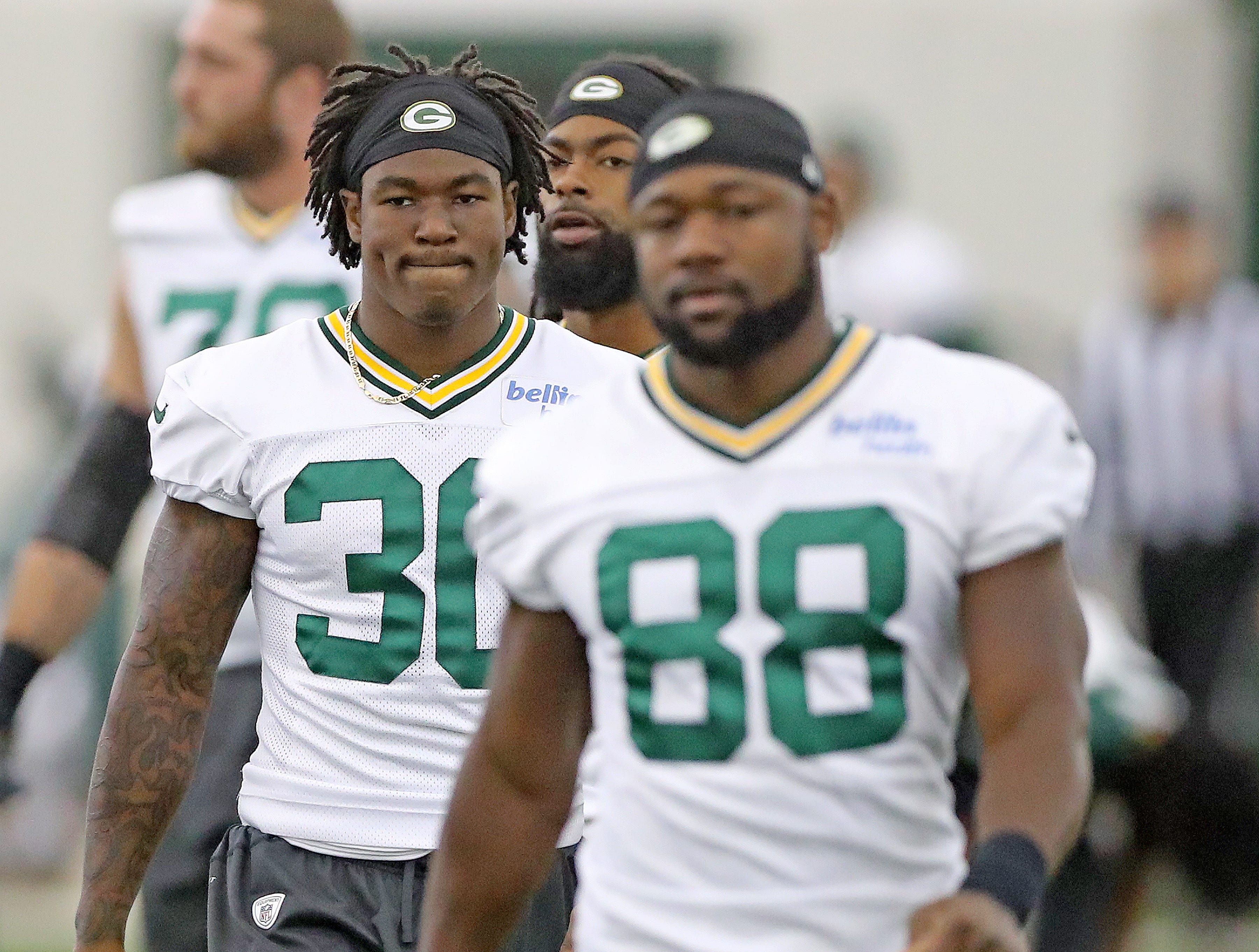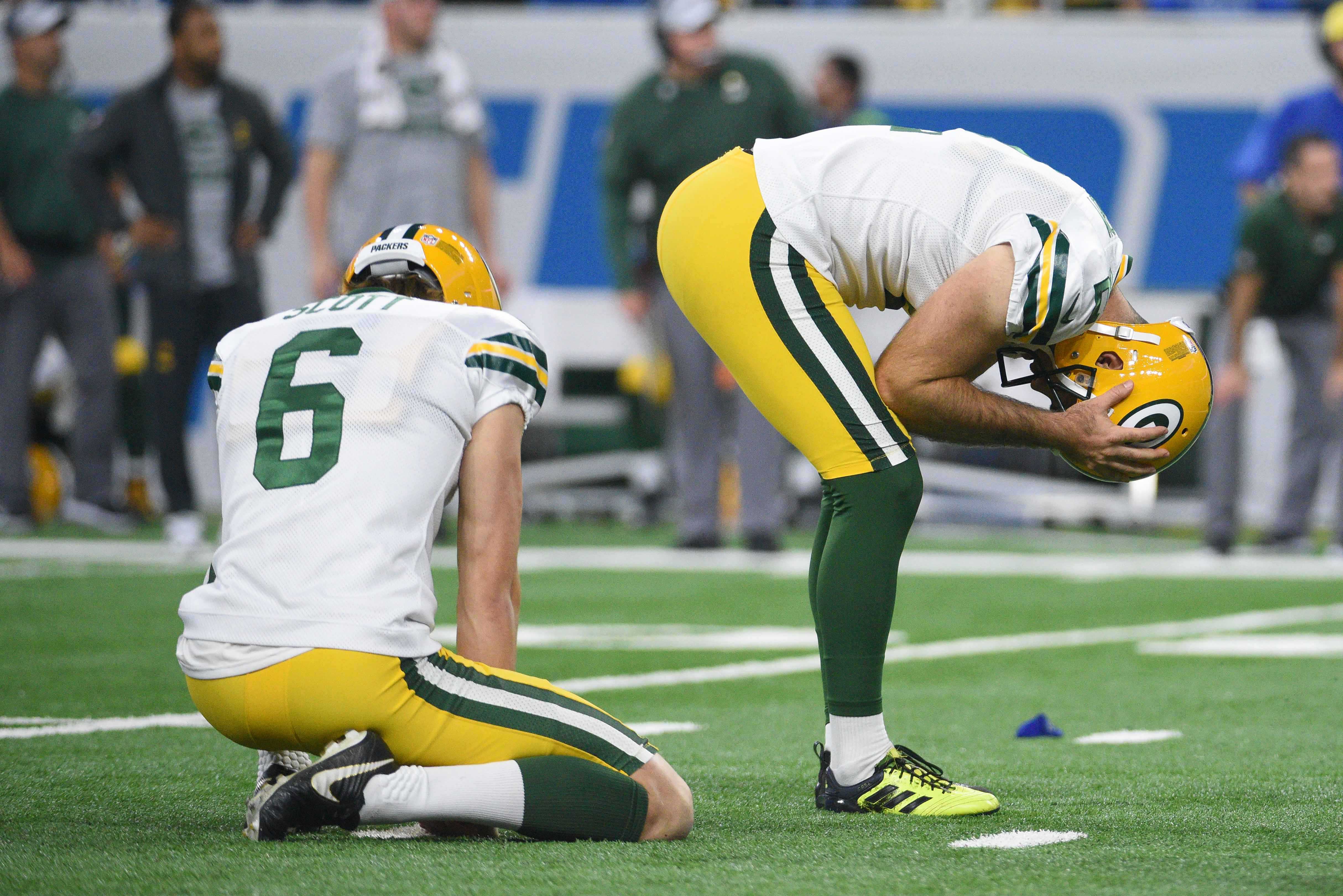Dougherty: Best advice for Mason Crosby? Don't even think about it
 Pete Dougherty
Pete Dougherty

In 1981, the Oakland Raiders’ Chris Bahr missed five kicks in a game. Twice.
In Week 2 that season, he went 1-for-6 on field goals. Then in December he was 1-for-5 and missed an extra point.
Bahr, in his fifth NFL season at the time, retained his job, won a Super Bowl ring with the Raiders that year and went on to kick nine more seasons in the league. Now 65 and living in Pennsylvania, he still remembers the feeling in those games.
“You just don’t feel comfortable, and every time you turn around they’re kicking,” he said this week. “You go out there, you’re a professional, you do what you can and keep kicking away. (But) I don’t care who you are in any sport, you have times it’s just a struggle for whatever reason. Just a bad day.”
Bad day indeed. Mason Crosby, the Green Bay Packers’ 12th-year kicker, is now decidedly in that disastrously bad-day club after missing five kicks (1-for-5 on field goals and a missed extra point) in his team’s 31-23 loss Sunday at Detroit.
And that club is a small one. According to data from Pro Football Reference, since the 1970 NFL-AFL merger kickers have missed some combination of five field goals and extra points 11 times. No one in that time, from what I could find, has missed six.
RELATED: Support for struggling kicker Crosby remains strong
RELATED: Packers downplay talk of discord in secondary
We’ll start by pointing out that four of the 10 players on that list (remember, Bahr is a two-time member) kicked in the NFL for at least six more seasons after their horrendous day (Bahr, Jim Turner, Errol Mann and Rolf Benirschke). But for two others (Jeff White and Bruce Gossett), it was their last season in the league.
The issue then, as for Crosby now, is where things go from here.
Kicking is one of the great head games of the NFL, and the list of kickers who’ve seen their careers implode because of a bad game, or even one bad kick in the clutch, is plenty long. Two prominent, recent examples are Blair Walsh and Roberto Aguayo.
Walsh was a top kicker for Minnesota from 2012-15, that is until he badly missed a last-second 27-yard field goal that would have won a playoff game. He never got his mojo back and now is out of the league. The Tampa Bay Buccaneers traded up into the second round to draft Aguayo in 2016, but he started missing kicks in training camp and never recovered. He hasn’t caught onto an NFL roster since his bad rookie season.
On the other side, you have Bahr, who recovered from his two-time epic failure to kick nine more years in the league. And even Crosby came back from a career-threatening 2012 season (when he made a league-low 63.6 percent of his attempts) to be the rock-solid kicker he has been for the Packers the last five-plus years.
The key to recovering from an unimaginably bad performance, sports psychologists say, is to avoid dwelling even though that’s where the mind wants to go. Don’t think about pink elephants.
“Not reinventing the wheel this week,” Crosby said after practice Thursday. “Like I said, it’s an anomaly that’s something I never will experience again and nothing I could have ever fathomed happening. Obviously disappointed about it but nothing I can do now but move forward.”
To get a better sense for what athletes should do when they have a game like Crosby’s, especially at a finely tuned skill like kicking that is similar in so many ways to golf, I talked with Aynsley Smith, a sports psychologist at the Mayo Clinic and one of the foremost researchers in the world on the yips.
When an athlete she works with has a game like Crosby, she first has him talk through what happened, and when finished, quickly move on describing some of the best kicks and games of his career. She records it so he can listen later to reinforce the feelings of those successes. Then whenever the misses pop into his mind, she has him pretend his brain is a television and hit the remote to conjure the good feelings to replace the bad.
“He’s gone from being almost automatic for a great many kicks, then all of a sudden there’s this bad one,” she said. “You get tense a little bit and the muscles get a little tight. Then you almost yip perhaps on the second, third and fourth (miss). The faster he makes the transition and doesn’t keep ruminating — it’s almost like your brain is stuck in an old-fashioned long-playing record. Keep going over and over the bad part. By channel clicking as fast as possible onto the positive channel (the negative thoughts are blocked).”
SILVERSTEIN: Running back rotation makes no sense
PACKERS CHAT: Do NFL coaches have a shelf life?
Crosby said the Packers have a sports psychology consultant he has worked with regularly, and without getting into details suggested they’ve developed similar techniques over the past few years.
“I definitely never dwell on the negatives,” he said. “I try to be a positive guy and make sure — my job is looking at the positives and things you do well over the things that went wrong, because there’s more of those, and success breeds success.”
There’s not the time or space here to detail what goes wrong with the Walshes and Aguayos of the NFL, or the golfers (and musicians) whose careers are waylaid by the yips. In a nutshell, Smith said there are two ends of a continuum for the yips. On one end it’s psychologically initiated; on the other is physical deterioration of the neuropathways that an expert has developed from repetitive use of specific muscle groups over the years.
Smith said that those susceptible to the physiological yips are a few years older than Crosby, who is 34.
“We all have at one time choked,” Smith said, “whether giving a talk in front of a large audience or something, we kind of freeze up. When that happened, you start to get a little scared because you lost a stroke or two (in golf), then adrenaline kicks in and that causes tenseness in the muscles. I was hoping in his case it would be approached first as a hiccup in this season and he’d get in touch with his successful inner self.”
In the high-pressure world of the NFL, games and jobs are on the line, and kickers especially have short leashes. Crosby’s long history with the Packers and recovery from the 2012 season work in his favor, both as a sign of his resilience and as justification for the Packers to stick with him.
But you never know what might happen, so Monday night will be a big game for Crosby to help push last week’s astonishing performance out of his mind.
“I’m looking forward to getting back on the field and competing and doing my job,” he said.
You never know what’s really going on in someone’s head, but he’s at least espousing the attitude a sports psychologist, or teammate, would want.